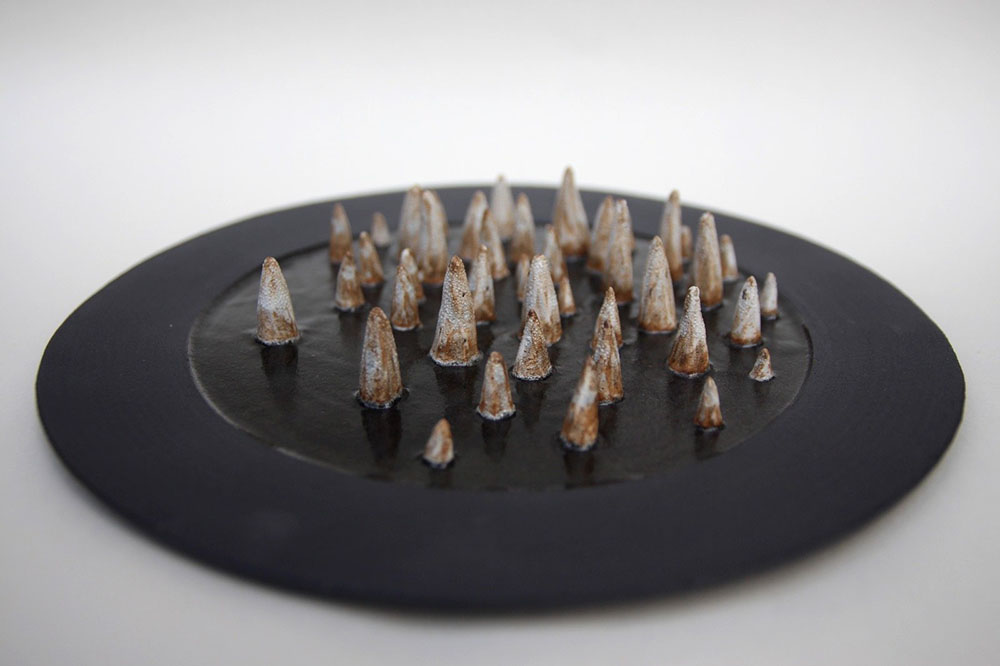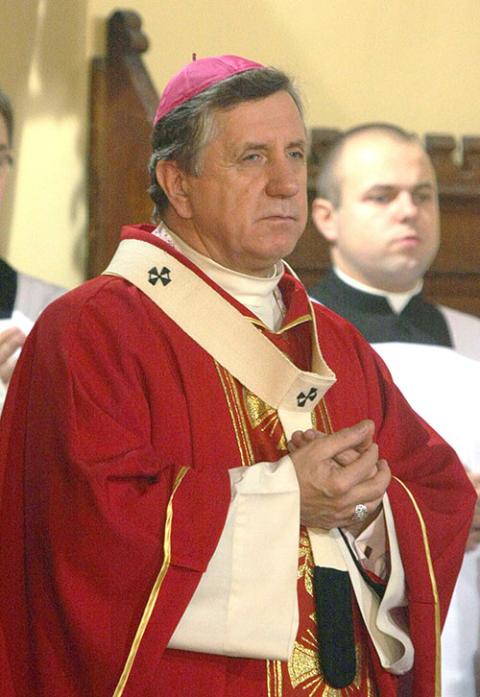
Pictured is "A Plate of the Survivors," designed by Polish Dominican Fr. Tomasz Bilka and crafted by Polish artists Anna Bogdanowicz and Zuzanna Surma as a sign of the pain of abuse victims. (OSV News/Wiez Magazine/Zbigniew Nosowski)
The announcement that Pope Francis had accepted the resignation of Archbishop Andrzej Dziega of Szczecin-Kamien with no explanation in a Feb. 24 statement from the apostolic nunciature caused a bittersweet reaction in Poland, once viewed as the testing ground for the 2019 Vatican document on bishops' accountability.
Dziega was known for ignoring the victims of sexual abuse for years in his archdiocese, but in a letter explaining his resignation to priests of the archdiocese he said the reason was health oriented, a "radical weakening of my condition."
At age 71, he is four years younger than the age at which canon law requires bishops to submit their resignation to the pope.
He also apologized to the priests for his "weaknesses," not mentioning the victims of sexual abuse who were outraged when the letter went viral across social media in Poland over the Feb. 24-25 weekend.
Under public pressure, including from Poland's bishops, the nunciature, or Vatican embassy, released another statement Feb. 26 specifying that the decision related to Archbishop Dziega's departure followed "an investigation by the Holy See into the management of the diocese, and in particular the negligence referred to in the papal document 'Vos Estis Lux Mundi.' "
"Couldn't this be said right away?" asked Polish theologian Fr. Grzegorz Strzelczyk on X, formerly Twitter.
"So he was hypocritically lying!" said Tomasz, a survivor of abuse by a priest of the Szczecin-Kamien Archdiocese, about the official reason the archbishop gave for his resignation. Tomasz, who wanted to give only his first name, told OSV News that he is appalled that "over all this the bishop leaves without punishment."
Advertisement
The course of the investigation was never made public, but the Polish magazine Wiez reported in January 2021 that at least four complaints about the archbishop were sent to the Vatican under "Vos Estis," the papal document first issued in 2019 on the responsibilities and accountability of bishops and religious order superiors with regard to clergy sex abuse. "Vos Estis" allows for the removal of bishops and superiors for serious negligence or "lack of diligence" in the exercise of their office, in particular with regard to the sexual abuse of minors.
OSV News asked Cardinal Robert Prevost, prefect of the Dicastery for Bishops, about the status of the investigation against Dziega, as the victims of sexual abuse never received word on it being closed, and the nunciature's statement didn't reveal it. OSV News also asked Prevost whether there are plans to communicate reasons for a bishop's resignation if the public already knows an investigation was conducted against a certain bishop.
Survivors in Poland demand transparency in Dziega's case, as they say official reasons announced by the archbishop himself only deepen their pain and anger at the church.
"I don't know whether you want to quote me in a story, because I would have to swear a lot," Robert Fidura, survivor of sexual abuse, told OSV News when asked about his reaction to the archbishop's letter.
"The new statement from the nunciature makes things a little better, but the fact that the Vatican, five years after publishing 'Vos Estis,' cannot immediately communicate those cases will only mean the scandal will continue and the anger will grow," he said.
The Szczecin-Kamien Archdiocese is one of the darkest spots on the map of church cover-up in Poland because of several cases, including the case of Fr. Andrzej Dymer.
In 1995, a group of teachers at the Brother Albert shelter, founded by Dymer in 1991 in Szczecin, accused the priest of sexually abusing boys. They were ignored by the archdiocese. The allegations were known but ignored by three archbishops in a row, with Dymer along the way becoming director of a Catholic school and a church-run medical institution.
Dymer died Feb. 21, 2021, and Dziega was seen blessing his coffin. Days before Dymer's death, on Feb. 12, the Vatican had found the priest guilty of sexual abuse. One of his victims learned that fact two years later only because his lawyer had requested information.
In 2010, 15 years after the first formal complaint from victims, Dziega made Dymer director of John Paul II Medical Institute in Szczecin. In 2019, Dymer sued his own victims for defamation.
Marcin Mogielski fought for Dymer's victims from the early years when he joined the Dominican order. He was one of the first victims of the priest as an altar boy. The church's negligence in that particular case, and the pain Mogielski and other victims for whom he advocated suffered from church hierarchy, were among the reasons why he left the Catholic Church and became Lutheran. His own brother was a teacher at Dymer's shelter and one of the first whistleblowers in this case.
"It doesn't hurt as much as it hurt earlier," Mogielski told OSV News, "because I simply didn't expect much from the actions of the bishops." Dziega's letter "is spitting in the face of victims," he said.
"I would expect higher standards from an institution that invokes Jesus and the Gospel, I would expect it to be transparent, to clearly name all these bad things, covering for criminals, destroying evidence or persecuting whistleblowers," he said of his own experience.
What he went through, he said, was "intimidation and resentment." He was told by Dziega's predecessor, Archbishop Zygmunt Kaminski, that he didn't "have a right to investigate," that Dymer was a "good priest," and that Mogielski "refuses to see" the "good that he has done for these boys" and only focused "on the bad."
"My heart is bleeding" that in the church "I see mafia-like behavior," because Dymer was a sleek fundraiser, Mogielski told OSV News.

Archbishop Andrzej Dziega of Sandomierz, Poland, is pictured in a file photo. (OSV News/KNA/Markus Nowak)
Four auxiliary bishops in Poland also were scandalized by the announcement of the archbishop's resignation and said it out loud — not often a practice among bishops.
The first one to speak up in his Facebook post was Auxiliary Bishop Artur Wazny of Tarnów.
"I am speechless & anger, malice and shame are mixed up with each other," Bishop Wazny wrote Feb. 25. Three other auxiliaries followed suit with their own Facebook posts Feb. 26.
Auxiliary Bishop Grzegorz Suchodolski of Siedlce said that he stands "with what Bishop Artur Wazny wrote and what he thinks & there are moral choices much more important than any given episcopal posts."
Auxiliary Bishop Adam Bab of Lublin wrote that "the deficit of truth pains yet once again and is even deeper. I know it from the survivors."
Auxiliary Bishop Piotr Wawrzynek of Legnica said: "I pray for every person that except from experiencing a 'home' in the church, experiences the wounds instead."
"I am really grateful. They acted as a truly decent person would," Fidura told OSV News about those bishops' responses.
Another victim, using the pseudonym Toska Szewczyk, met with these four auxiliary bishops during the Jan. 30-31 Council for Youth Ministry of the Polish bishops' conference.
Earlier, in November 2023, during a meeting of the bishops' conference, Wazny brought "A Plate of Survivors" to present to his brother bishops. It was a sculpture of a plate with thorns from which "it is impossible to eat," Szewczyk wrote to the bishops, telling them about survivors' constant pain.
"My reaction today is a consequence of meeting Toska, in bringing the 'plate' and her letter to bishops," Wazny told OSV News.
"It is looking a victim in the eye that changes the perspective. You're not a hierarchy any more, there is no saying, 'Do this or that.' No, there is listening to someone's pain, there is asking how they feel, and only after this you understand how much letters like the one of Archbishop Dziega hurt those people," he said.
"Everyone can write a letter when he leaves the diocese, even the bishop that has been removed after allegations," Wazny said. "But with this one, the cup has just overflowed and I could not stay silent."
The next bishops' meeting in Poland will start in mid-March, and the bishops will choose the new president at the beginning of the meeting. One of the primary tasks of the new head of the bishops' body will be to lead Poland's hierarchy through the abuse crisis, with the commission to investigate past cases currently being organized.
Poland has become a testing ground for the newest Vatican's abuse regulations, with 15 bishops under investigation for a cover-up, of whom two were cleared from allegations, 12 found guilty of a cover-up and one still pending. Three other bishops, including one cardinal, were accused of sexual abuse, with one found guilty, one cleared of any allegations and one case still pending, according to Tomasz Krzyzak, a Polish journalist with Rzeczpospolita.
"Poland's 'Spotlight' moment fell precisely into the timing in which 'Vos Estis' was released by the Vatican. That's why it looks like in Poland the nunciature is learning by its own mistakes in not revealing proper information on the reason for bishops' resignations," he told OSV News.
By "Spotlight," Krzyzak was referring to an investigative unit of the Boston Globe that broke the news in January 2002 about the sex abuse scandal in the Archdiocese of Boston.
Wazny said that for things to permanently change in the church in Poland, "I think that we should simply be the church — that is, a gathering of people who look into each other's eyes and in the middle of them is the Lord Jesus."
For Tomasz, an abuse survivor, "Bishop Artur's words are important," but "they have no causality," he said.
"The metropolitan bishops are silent," and they are the ones who have power to change things, he told OSV News.
Other survivors, however, look for state's intervention to bring real change.
"Until the state intervenes, like in other countries, nothing will change," said Fidura.
Zbigniew Nosowski, editor in chief of Wiez magazine who has written about the investigation of abuse in the Archdiocese of Szczecin-Kamien, calls the wider problem of the church in Poland "the Dziega mentality."
"Without public accountability for the actions and inactions of the former metropolitan of Szczecin, the 'Dziega mentality' cannot be effectively discarded in the church," he said. "The state justice system also has its role to play."





